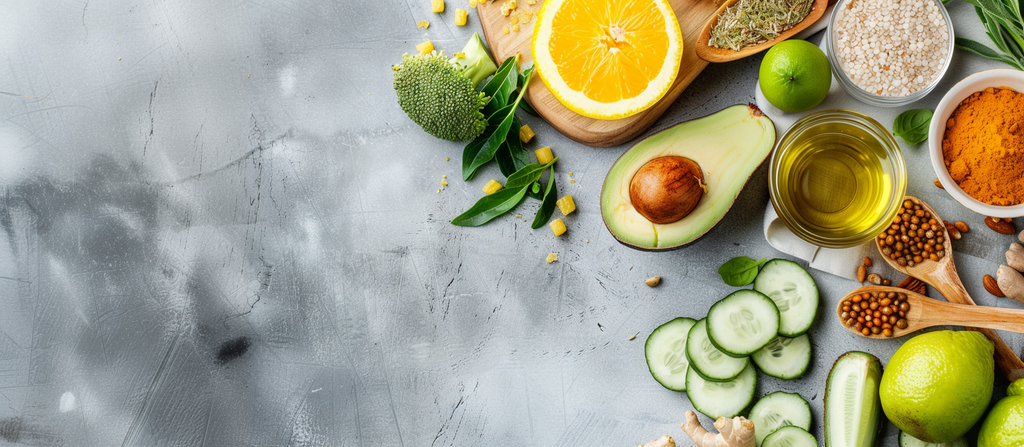Ever had that gut feeling something's not quite right with your digestion? You're not alone. As a naturopath with over 10 years of experience, I've seen countless patients struggle with digestive issues, low energy, and even mood swings – all potentially linked to an unhappy gut.
Key Takeaways
| Gut Health Importance |
- Central to overall wellness - Affects digestion, immunity, and mental health |
|---|---|
| Probiotics |
- Live beneficial bacteria - Support digestive balance - Found in fermented foods and supplements |
| Prebiotics |
- Non-digestible fibers - Feed beneficial gut bacteria - Found in many plant-based foods |
| Benefits |
- Improved digestion - Enhanced immune function - Potential mood regulation |
| Natural Sources |
- Yogurt, kefir, sauerkraut (probiotics) - Garlic, onions, bananas (prebiotics) |
| Implementation |
- Gradually increase intake - Combine probiotic foods and supplements - Consult a naturopath for personalized advice |

Introduction: The Gut-Health Revolution
Here's the exciting bit: we're in the midst of a gut-health revolution. Scientists are uncovering just how crucial our gut microbiome – that bustling community of trillions of microorganisms living in our digestive tract – is to our overall health. And the stars of this show? Probiotics and prebiotics.
In this article, we'll look at gut health, exploring how these mighty microbes and their favorite foods can transform your wellbeing. So, grab a cup of kombucha (a probiotic powerhouse!), and let's embark on this journey to a happier, healthier gut.

Understanding the Gut Microbiome: Your Internal Ecosystem
What is the Gut Microbiome?
Imagine a thriving city within your digestive system, populated by trillions of microscopic inhabitants. That's your gut microbiome – a complex ecosystem of bacteria, viruses, and fungi that play a crucial role in your health.
Why is Gut Health So Important?
Your gut does far more than just digest food. It's intimately connected to your immune system, mental health, and even your skin's appearance. Here's why a healthy gut matters:
- Digestion and Nutrient Absorption: A balanced microbiome helps break down food and absorb essential nutrients.
- Immune Function: About 70% of your immune system resides in your gut.
- Mental Health: The gut-brain axis connects your digestive system to your mood and cognitive function.
- Inflammation Control: A healthy gut helps regulate inflammation throughout the body.

Probiotics: Your Gut's Friendly Neighbors
What Are Probiotics?
Probiotics are live microorganisms that, when consumed in adequate amounts, confer a health benefit. Think of them as reinforcements for the beneficial bacteria already living in your gut.
Benefits of Probiotics for Gut Health
- Improved digestion
- Reduced bloating and gas
- Enhanced nutrient absorption
- Strengthened immune system
- Potential mood regulation
Natural Sources of Probiotics
- Yogurt (look for "live and active cultures")
- Kefir
- Sauerkraut
- Kimchi
- Kombucha
- Miso
Probiotic Supplements: A Helping Hand
While food sources are ideal, high-quality probiotic supplements can provide targeted support. Look for:
- Multiple strains (e.g., Lactobacillus and Bifidobacterium)
- CFU (Colony Forming Units) count of at least 1 billion
- Guaranteed potency through expiration date
Prebiotics: Feeding Your Gut's Good Guys
What Are Prebiotics?
Prebiotics are types of dietary fiber that feed the beneficial bacteria in your gut. They're like fertilizer for your internal garden.
Benefits of Prebiotics
- Promote growth of beneficial bacteria
- Improve calcium absorption
- May help with weight management
- Support regular bowel movements
Natural Sources of Prebiotics
- Garlic
- Onions
- Leeks
- Asparagus
- Bananas (slightly unripe)
- Jerusalem artichokes
- Chicory root
Synbiotics: The Dynamic Duo
Combining probiotics and prebiotics creates a synergistic effect called synbiotics. This powerful combination can supercharge your gut health efforts.
Implementing Probiotics and Prebiotics: A Naturopath's Advice
As a naturopath, I've guided many patients through the process of improving their gut health. Here are some key tips:
-
Start Slowly: Introduce probiotic and prebiotic foods gradually to avoid digestive upset.
-
Diversify Your Diet: Aim for a variety of probiotic and prebiotic sources.
-
Consider Supplements: High-quality probiotic supplements can be beneficial, especially after antibiotic use.
-
Stay Hydrated: Water helps fiber do its job effectively.
-
Manage Stress: Chronic stress can negatively impact gut health.
-
Get Moving: Regular exercise supports a healthy gut microbiome.
GUT OPTIMAX Health Superfood Powder 65g - Slippery Elm, Aloe Vera.
Gut Optimax is a powerful, food-based prebiotic blend formulated by our naturopath to help you achieve optimal gut health.
View Now
Q&A: Your Burning Gut Health Questions Answered
Q: Can probiotics help with specific health conditions?
A: While research is ongoing, probiotics show promise for conditions like irritable bowel syndrome (IBS), inflammatory bowel disease (IBD), and even eczema. However, it's crucial to consult with a healthcare professional for personalized advice.
Q: Are all yogurts good sources of probiotics?
A: Not all yogurts are created equal. Look for labels that specify "live and active cultures." Avoid yogurts with high sugar content, as excess sugar can feed harmful gut bacteria.
Q: Can I take probiotics while on antibiotics?
A: Yes, but timing is key. Take probiotics at least 2 hours before or after your antibiotic dose. This helps ensure the beneficial bacteria aren't immediately killed off by the antibiotic.
Q: How long does it take to see benefits from probiotics and prebiotics?
A: This varies from person to person. Some may notice improvements in digestion within a few days, while others might take several weeks to experience significant changes. Consistency is key!
Gut Health APEX Natural Gut Health Supplement Powered by Kakadu Plum - Down to Earth
The Gut-Brain Connection: Your Second Brain
Now, let's delve into something truly fascinating – the gut-brain connection. Did you know your gut has been dubbed the "second brain"? It's not just a catchy phrase; there's solid science behind it.
The Enteric Nervous System: A Neural Network in Your Gut
Your gut houses the enteric nervous system (ENS), a complex network of neurons that lines your gastrointestinal tract. This remarkable system can operate independently of the brain and spinal cord. It's like having a mini-brain in your belly!
Neurotransmitters: Not Just in Your Head
Here's a mind-bender for you: your gut produces a significant amount of neurotransmitters. Take serotonin, often called the "happy hormone." Would you believe that about 90% of your body's serotonin is produced in the gut? It's no wonder that gut health can profoundly impact your mood and mental wellbeing.
Vagus Nerve: The Gut-Brain Superhighway
The vagus nerve acts as a two-way communication channel between your gut and brain. It's like a busy motorway, constantly ferrying information back and forth. This explains why stress can upset your stomach, or why a troubled gut can send signals of anxiety to your brain.

Leaky Gut Syndrome: When Your Gut Barrier Breaks Down
Let's talk about a condition that's been getting a lot of attention in the naturopathic world – leaky gut syndrome. It's a bit like having a faulty filter in your digestive system.
What is Leaky Gut Syndrome?
Imagine the lining of your intestines as a fine mesh. Normally, it allows only tiny particles of digested food to pass through. But when this lining becomes damaged or inflamed, larger particles can slip through – hence the term "leaky gut."
Symptoms of Leaky Gut
- Chronic diarrhea, constipation, or bloating
- Nutritional deficiencies
- Fatigue
- Skin problems like acne or eczema
- Headaches
- Joint pain
The Role of Probiotics in Healing Leaky Gut
Probiotics can play a crucial role in repairing a leaky gut. They help strengthen the gut barrier, reduce inflammation, and restore balance to the gut microbiome. Specific strains like Lactobacillus plantarum and Bifidobacterium longum have shown promise in supporting gut barrier function.
The Microbiome and Autoimmune Conditions
There's growing evidence linking gut health to autoimmune conditions. It's a bit like your gut microbiome holding the keys to your immune system's control room.
Gut Dysbiosis and Autoimmunity
When your gut microbiome is out of balance (a condition known as dysbiosis), it can lead to increased intestinal permeability and chronic inflammation. This, in turn, may trigger or exacerbate autoimmune responses.
Probiotics as Immune Modulators
Certain probiotic strains have shown potential in modulating the immune system. For instance, Lactobacillus rhamnosus GG has been studied for its ability to reduce inflammation and support immune function.

The Future of Gut Health: Personalized Probiotics
We're on the cusp of a new era in gut health – personalized probiotics. Imagine a probiotic supplement tailored specifically to your unique gut microbiome profile. It's not science fiction; it's where the field is heading.
Microbiome Testing: A Snapshot of Your Gut
Advanced microbiome testing can provide a detailed map of your gut bacteria. This information can be used to create a targeted probiotic and prebiotic protocol that addresses your specific needs.
Precision Probiotics: Tailored to You
In the near future, we may see probiotic supplements that contain specific strains chosen based on your individual microbiome composition and health goals. It's the epitome of personalized medicine.
Fermented Foods: Nature's Probiotic Powerhouses
While we've touched on fermented foods earlier, let's dive deeper into these microbial marvels. They're not just good for you; they're fascinating from a cultural and historical perspective too.
Kefir: The Champagne of Dairy
Kefir, a fermented milk drink, contains a diverse array of probiotic strains. It's like a microbial party in a glass! Originating from the Caucasus Mountains, kefir has been consumed for centuries for its health benefits.
Kombucha: The Fizzy Fermented Tea
Kombucha has taken the health world by storm. This effervescent drink is made by fermenting tea with a symbiotic culture of bacteria and yeast (SCOBY). It's not just trendy; it's a probiotic powerhouse.
Tempeh: Fermented Soybean Superfood
Hailing from Indonesia, tempeh is made from fermented soybeans. It's not only a great source of plant-based protein but also packs a probiotic punch. Plus, the fermentation process makes the nutrients in soybeans more bioavailable.

Prebiotics Beyond the Basics: Hidden Sources
We've covered the well-known prebiotic foods, but let's explore some less obvious sources:
- Green Bananas: The resistant starch in unripe bananas is a potent prebiotic.
- Seaweed: Certain types of seaweed contain unique prebiotic compounds.
- Cacao: Yes, dark chocolate lovers rejoice! Cacao is a source of prebiotic fiber.
- Tiger Nuts: These small tubers are rich in resistant starch and inulin.
Gut Health and Skin: The Gut-Skin Axis
Your gut health and skin health are more closely linked than you might think. It's a connection we in the naturopathic community have long recognized, and now modern science is catching up.
Acne and the Microbiome
Studies have shown that people with acne tend to have a different gut microbiome composition compared to those with clear skin. Probiotics may help by reducing inflammation and regulating sebum production.
Eczema and Gut Health
There's growing evidence that probiotic supplementation, particularly in early life, may help prevent or reduce the severity of eczema. It's all about balancing the immune system, which starts in the gut.

Sleep and Gut Health: A Two-Way Street
Here's something that might keep you up at night: your gut health can affect your sleep, and your sleep can affect your gut health. It's a fascinating feedback loop.
Melatonin Production in the Gut
Did you know that your gut produces melatonin, the sleep hormone? In fact, your gut contains 400 times more melatonin than your pineal gland (the brain's sleep center).
The Circadian Rhythm of Your Gut
Your gut microbiome has its own daily rhythms. Disrupting these rhythms through irregular eating patterns or shift work can throw your gut health out of whack.
Intermittent Fasting and Gut Health
Intermittent fasting isn't just about weight loss; it can have profound effects on your gut health too.
Fasting as a Reset Button
Short periods of fasting can act like a reset button for your gut. It gives your digestive system a break and can promote the growth of beneficial bacteria.
The Migrating Motor Complex
Fasting activates the migrating motor complex, a cleansing wave that sweeps through your intestines, clearing out debris and potentially harmful bacteria.
Environmental Factors Affecting Gut Health
Your gut doesn't exist in isolation. Environmental factors play a huge role in shaping your microbiome.
The Hygiene Hypothesis
While cleanliness is important, over-sanitizing might be doing our gut bacteria a disservice. Exposure to a variety of microbes, especially in childhood, helps build a robust and diverse microbiome.
Urbanization and the Microbiome
Studies have shown that people living in urban environments tend to have less diverse gut microbiomes compared to those in rural areas. It's a reminder of the importance of connecting with nature for our gut health.
Your Gut, Your Health, Your Life
As we've explored, the world of gut health is vast and intricate. From the gut-brain connection to the future of personalized probiotics, it's clear that nurturing your gut microbiome is one of the most powerful steps you can take for your overall health.
Conclusion: Your Path to a Happier, Healthier Gut
Embarking on a gut health journey with probiotics and prebiotics can be transformative. As a naturopath, I've witnessed countless patients rediscover their vitality through these simple yet powerful interventions.
Remember, your gut is as unique as you are. What works for one person may not work for another. That's why it's crucial to listen to your body and work with a qualified healthcare professional to develop a personalized gut health strategy.
By nourishing your internal ecosystem with probiotics and prebiotics, you're not just supporting your digestion – you're investing in your overall health and wellbeing. So, here's to happy guts and healthier lives!
This article is for informational purposes only and does not constitute medical advice. Always consult with a qualified healthcare professional before making significant changes to your diet or starting any new supplement regimen.









